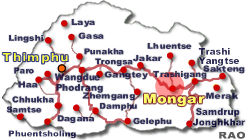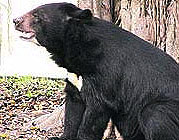|
Bhutan's
Nature - Animals
|
 |
Bhutan Nature Animals |
|
 |
Bhutan Information |
|
|
 |
|
Mongar:
Bear mauls village girl
|
 |
November
2006
 |
| Doctors
at the Mongar Regional Referral Hospital are treating a 13-year-old girl
who was mauled by a bear and lost her upper lip, nose and left cheek.
The
girl from Thangrong, Mongar, was referred to the hospital on Friday, a
day after she was attacked by the bear and admitted to the village Basic
health unit (BHU). |
|
According
to the parents, the girl had left the house at about 5:00 pm to spend the
night at her friend's house and was attacked by the bear on the way.
 |
| The
mother reported that her daughter was attending the non-formal education
(NFE) programme and had to walk for almost an hour to reach the NFE centre.
"On
that day she decided to stay with her friend so that she didn't have to
start early the next day," her mother said.
|
|
The
mother said that the girl had continued walking to her friend's place even
after the attack. "I don't know when she regained her consciousness but
when she reached her friend's house, her friend did not recognise her and
had screamed and ran after seeing her face," she said.
The
village chupen (messenger), who was a neighbour of the friend, informed
the parents about the incident.
The
Mongar district medical officer, Dr. Lotay, said that the girl needed to
undergo face reconstruction treatment, which could not be done in Bhutan.
"But
we are in touch with hospitals in Kolkata and Vellore in India and will
be referring her to either of the two hospitals as soon as we get the response,"
said the doctor. "We could not send her immediately because of the wound
infection."
The
doctor said that girl was in a stable condition and had not suffered other
injuries. "Since she lost whole of upper lip, we are tube feeding her,"
he said.
"The
only risk is the infection of the face. She can have a functional face
but structurally, it would be impossible to bring back to normal," said
Dr. Lotay.
According
to the father of the girl, villagers had later traced footprints of two
bears. He said that this was the first time somebody was attacked by a
bear in the village. "We never had or heard of such incidences earlier,"
he said.
The
girl was the youngest of seven children in the family.
top
|
Punakha:
Man severely mauled |
 |
November
2006
 |
| 61-year-old
man from Gumkamu in Punakha was severely mauled by a bear on November 22
barely a week after a village girl in Mongar was mauled.
The
man, Wangdi, was on his way to the forest to collect firewood with a friend
when a bear suddenly appeared and attacked him. |
|
According
to Wangdi, who is now recuperating at the national referral hospital in
Thimphu, his friend fled the scene while he wrestled the bear. "It freed
me after I stabbed him thrice in the stomach with my Bachem (short sword),"
he said.
"As
the bear bit my left hand I managed to free my right hand and reached for
my Bachem. After I stabbed thrice the bear rolled over and left."
His
friend returned after a while and carried him back to the village. Wangdi
was admitted to the Punakha hospital.
According
to the surgeon general in Thimphu, Dr. Thant Naing, Wangdi had suffered
fractured bones on his face and ear when he was brought to the hospital.
"He had also lost three of his fingers."
Bear
attacks, especially at this time of the year, is common in almost all regions
of the country.
According
to nature conservation specialists, the most common bear found in Bhutan
is the Himalayan black bear. It is found in almost all over the country.
"While the Sloth bear and Brown bear are also found in Bhutan, it is always
the Himalayan Black bear that humans encounter," said conservation specialist,
Dr. Sangay Wangchuk of the Nature Conservation Division.
"Humans
are not the major prey for the Himalayan Black bear since they are omnivore,"
he said. "It is their instinctive behaviour to attack. They attack in self
defense."
The
specialist said that bear attacks are common at this time of the year because
they are preparing to hibernate for the winter. "The bears are roaming
freely in search for food and when they encounter humans they attack in
self defense or out of fright."
Although
no study had been done on bears, the Nature Conservation Division of the
agriculture ministry is carrying out a survey on bears in Bhutan, according
to Dr. Sangay Wangchuk.
Villagers
believe that a person encountering a bear should never look at the animal
in the eye. "Provoked or unprovoked, bears never leave humans without inflicting
severe injuries," said retired lam Namgay who encountered a bear on the
way to Tshaluna, Thimphu, on October 25.
"You
should play dead if you see a bear," Namgay said. "The best way to prevent
an attack is to shout always when you are alone in the forest."
Records
maintained with Kuensel showed that bears had mauled about 40 people across
the country since the early 1990s. Five men, three women including an infant
were killed in bear attack.
Bears
also killed 115 heads of cattle and 54 pigs over a period of 15 years,
according to Kuensel records. Two bears were also killed in reprisal attacks.
Internet
sources said that the Himalayan black bear is the most carnivore of all
bears although it usually feeds on fruits and berries. |
 |
|
Punakha
Dzong |
|
Bear
mauls man to death
|
 |
 |
| A
48-year old man was mauled to death by a Himalayan black bear after he
tried to manhandle the bear. An apple orchard caretaker in Selikha, about
25 kilometers from Thimphu town, had shot the bear with a poisoned arrow
that he had set in a trap. In the morning he had followed a trail of blood
left by the injured 70-kilogramme male bear. |
|
Forestry
officials who investigated the incident believe that the injured bear had
turned back and attacked the man who was found later with a crushed skull
and multiple injuries. While such incidents are not common, bear attacks
in the country are not rare, according to forestry officials.
| Himalayan
Black bears are protected |
 |
In
fact people are regularly mauled by bears. Two weeks back, a bear mauled
a woman in her own kitchen garden in Khasakha, above Khasadrapchu. Another
bear escaped from a trap in an apple orchard in Pachakha, near Khasadrapchu.
Bears have attacked humans, destroyed crops, and cattle. The Himalayan
black bear was usually aggressive when provoked and it was commonly believed
that bears could wait for up to nine years to avenge an injury.
Autumn
is the bear's migratory season and time to prepare for hibernation so they
are frequently out in the orchards. The Himalayan Black bear falls under
the Schedule I of protected animals in the Forest and Nature conservation
Act. Although poaching of the bear is strictly prohibited, according to
the Act, traps or snares are allowed in private registered land like orchards
and crop fields. In Bhutan, bears are killed for the bile, which has medicinal
value and therefore fetches a good price.
| Contributed
by Ugyen Penjore and Nima Wangdi,KUENSEL,
Bhutan's National Newspaper 2006 |
 |
| Wildlife and People in Bhutan |
 |
| Information on Bhutan |
 |
|







